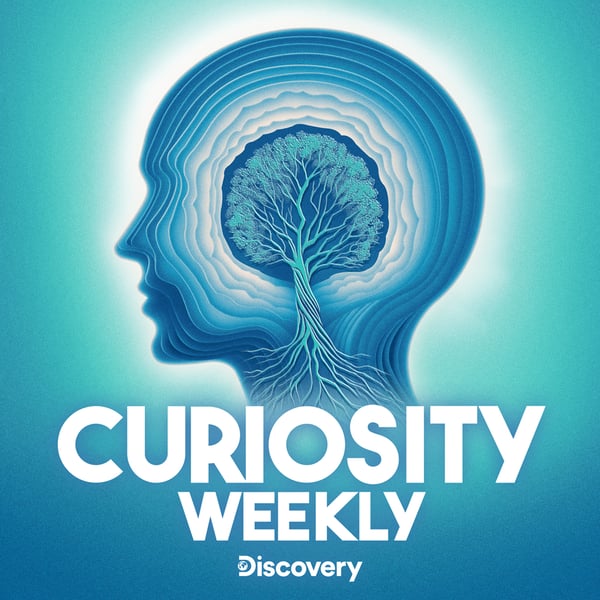Why People Ignore Facts in Medical Emergencies, Victorian-Era Credit Cards, and Adding a New Row to the Periodic Table
Curiosity Weekly
Warner Bros. Discovery
4.6 • 935 Ratings
🗓️ 21 May 2020
⏱️ 11 minutes
🧾️ Download transcript
Summary
Learn about why people tune out facts and trust their guts in medical emergencies; a Victorian-era version of credit cards; and how scientists are trying to add an eighth row to the periodic table of elements.
People tune out facts and trust their guts in medical emergencies by Kelsey Donk
- UTA study: In crisis, people trust feelings over facts. (2020). The University of Texas at Arlington. https://www.uta.edu/news/news-releases/2020/04/01/confidence-study
- Freling, T. H., Yang, Z., Saini, R., Itani, O. S., & Rashad Abualsamh, R. (2020). When poignant stories outweigh cold hard facts: A meta-analysis of the anecdotal bias. Organizational Behavior and Human Decision Processes, 160, 51–67. https://doi.org/10.1016/j.obhdp.2020.01.006
Instead of credit cards, Victorian shoppers had credit coins by Steffie Drucker
- Olaechea, D. (2014, February 13). Who Issued the First Credit Card? - NerdWallet. NerdWallet. https://www.nerdwallet.com/blog/credit-cards/issued-first-credit-card/
- MacDonald, J. (2017, July 11). The history of credit cards. CreditCards.Com; CreditCards.com. https://www.creditcards.com/credit-card-news/history-of-credit-cards.php
- Frellick, M. (2011, June 14). The rise and fall of the credit card magnetic stripe. CreditCards.Com; CreditCards.com. https://www.creditcards.com/credit-card-news/history-credit-card-magnetic-stripe-1273.php
- Diners Club - Company history of Diners Club. (2020). Dinersclubus.Com. https://www.dinersclubus.com/home/about/dinersclub/story
- Sienna Kossman. (2017, August 29). 8 FAQs about EMV credit cards. CreditCards.Com; CreditCards.com. https://www.creditcards.com/credit-card-news/emv-faq-chip-cards-answers-1264.php#1
Scientists are trying to add the eighth row to the periodic table by Cameron Duke
- Charley, S. (2012, January 13). How to Make an Element. Pbs.org; Nova. https://www.pbs.org/wgbh/nova/article/make-an-element/
- Moskowitz, C. (2014, May 7). Superheavy Element 117 Points to Fabled “Island of Stability” on Periodic Table. Scientific American. https://www.scientificamerican.com/article/superheavy-element-117-island-of-stability/
- Synthesizing new superheavy elements to open up the eighth period of the periodic table. (2020, April 24). Phys.org. https://phys.org/news/2020-04-superheavy-elements-eighth-period-periodic.html
- Tanaka, T., Morita, K., Morimoto, K., Kaji, D., Haba, H., Boll, R. A., Brewer, N. T., Van Cleve, S., Dean, D. J., Ishizawa, S., Ito, Y., Komori, Y., Nishio, K., Niwase, T., Rasco, B. C., Roberto, J. B., Rykaczewski, K. P., Sakai, H., Stracener, D. W., & Hagino, K. (2020). Study of Quasielastic Barrier Distributions as a Step towards the Synthesis of Superheavy Elements with Hot Fusion Reactions. Physical Review Letters, 124(5). https://doi.org/10.1103/physrevlett.124.052502
- Kelley, L. (2018, November 8). What Is the Island of Stability? Owlcation. https://owlcation.com/stem/What-is-the-Island-of-Stability
Subscribe to Curiosity Daily to learn something new every day with Cody Gough and Ashley Hamer. You can also listen to our podcast as part of your Alexa Flash Briefing; Amazon smart speakers users, click/tap “enable” here: https://www.amazon.com/Curiosity-com-Curiosity-Daily-from/dp/B07CP17DJY
Find episode transcript here: https://curiosity-daily-4e53644e.simplecast.com/episodes/why-people-ignore-facts-in-medical-emergencies-victorian-era-credit-cards-and-adding-a-new-row-to-the-periodic-table
Hosted on Acast. See acast.com/privacy for more information.
Transcript
Click on a timestamp to play from that location
| 0:00.0 | Hi, you're about to get smarter in just a few minutes with Curiosity Daily from Curiosity.com. |
| 0:06.1 | I'm Cody Goff. And I'm Ashley Hamer. |
| 0:08.0 | Today you learn about why people tune out facts and trust their guts in medical emergencies, a Victorian-era version of credit cards, |
| 0:15.9 | and how scientists are trying to add an eighth row to the periodic table of elements. |
| 0:20.5 | Let's set us fast some curiosity. Every single one of us can probably think of an irrational decision someone's made in the face of the coronavirus pandemic. |
| 0:30.0 | And according to a new study, that irrational decision actually makes some sense. |
| 0:34.7 | Researchers from the University of Texas at Arlington have found that when people sense a threat, |
| 0:39.7 | like in a health crisis, they're more likely to base their choices on anecdotal |
| 0:44.0 | information than on hard facts. Guilty is charged by the way. I don't know if this has |
| 0:49.7 | happened to you Ashley. Oh yeah for sure. So let's get into it. The studies set out to solve a conflict in the research. |
| 0:56.0 | When it comes to which kind of information is the most persuasive, the findings are split. Some say |
| 1:02.2 | statistics are the most compelling. Others say personal stories are. |
| 1:06.8 | So the researchers collected 61 studies on the question and rated the decisions they covered |
| 1:11.6 | based on their emotional engagement. |
| 1:14.2 | Specifically, they looked at whether the issues were health related, |
| 1:17.6 | whether there was a threat involved, and how personally relevant the decision was. |
| 1:22.8 | Sure enough, when emotional engagement was high, |
| 1:25.6 | as in when the decision was health-related, |
| 1:27.7 | threatening, and personally relevant, |
| 1:30.3 | people found anecdotal information |
| 1:32.4 | to be the most persuasive. |
| 1:34.0 | On the flip side, when a decision isn't particularly threatening or personal, |
... |
Please login to see the full transcript.
Disclaimer: The podcast and artwork embedded on this page are from Warner Bros. Discovery, and are the property of its owner and not affiliated with or endorsed by Tapesearch.
Generated transcripts are the property of Warner Bros. Discovery and are distributed freely under the Fair Use doctrine. Transcripts generated by Tapesearch are not guaranteed to be accurate.
Copyright © Tapesearch 2025.

